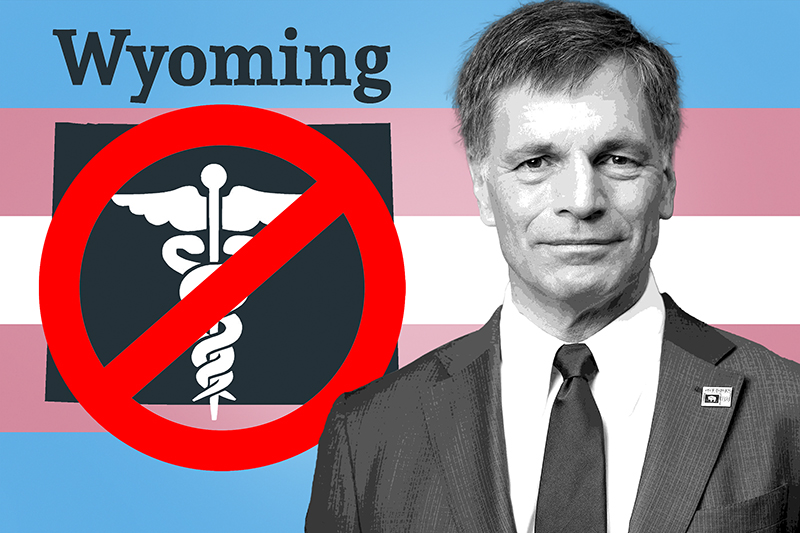Insurance Ban on Gender-Affirming Care Struck Down by Federal Court
Judge deems North Carolina State Health Plan's exclusion denying coverage for gender-affirming treatments to be discriminatory.

A federal court in North Carolina has struck down a prohibition in the state-run employee health insurance plan that prohibits coverage for gender-affirming treatments that assist a person in transitioning.
The insurance exclusion, contained in the North Carolina State Health Plan (NCSHP) for Teachers and State Employees, denied coverage for any transgender teacher or state employee’s — or their dependents’ — gender-affirming care, including hormone treatment or surgery.
In a 40-page opinion, U.S. District Court Judge Loretta C. Biggs, of the Middle District of North Carolina, ruled that the exclusion discriminates on the basis of sex, based on the idea that the denial of gender-affirming care discriminates based on gender identity, which “necessarily rests on a sex classification.” Biggs further noted, in her ruling, that without knowing the biological sex of an individual, it is impossible to know what type of gender-affirming treatments — which vary from person to person — an individual might need.
Biggs found that the exclusion specifically violates Section 1557 of the Affordable Care Act, prohibiting “any health care program or activity” that receives federal money from discriminating on the basis of “sex” — which the Biden administration has clarified in guidance includes discrimination on the basis of gender identity. Biggs also ruled that the exclusion violates a variety of U.S. laws preventing discrimination based on sex or gender identity.
“The sweeping exclusion contained within the NCSHP denies coverage for health care, including counseling, hormone therapy, surgical care, and any other health care provided in relation to a person’s transgender status and/or gender transition,” Biggs wrote. “This targeted discrimination against transgender people violates the Equal Protection Clause of the Fourteenth Amendment to the United States Constitution, Title IX of the Education Amendments of 1972, and Section 1557 of the Patient Protection and Affordable Care Act.”
While Biggs’ ruling was officially issued on June 10, the opinion wasn’t published until Dec. 5. The state has since appealed the ruling, arguing that the exclusion is valid and that gender-affirming treatments do not meet the criteria for what is considered medically necessary care.
As reported by Bloomberg Law, Biggs granted a permanent injunction prohibiting the state from seeking to enforce the insurance exclusion while the ruling is under appeal. The 4th U.S. Circuit Court of Appeals subsequently refused to block the injunction, meaning that the state employee health plan must cover gender-affirming treatments until a higher court rules otherwise.
Despite uncertainty over whether the insurance exclusion will remain struck down or be reinstated by a higher court at a later date, Biggs’ ruling marks a major victory for LGBTQ people at a time when transgender rights, in particular, are under attack.
This ruling provides the transgender community — and, by extension, LGBTQ people who might also be protected by Section 1557’s prohibitions on sex-based discrimination, which liberals have argued should extend to instances of discrimination based on sexual orientation — a ray of hope at a time when various state legislatures, particularly those controlled by Republicans, have proposed legislation to restrict LGBTQ rights.
Notably, several states have pushed bills seeking to bar access to gender-affirming care for minors — and in some states, for young adults in their 20s. While some of those laws have been challenged in the courts, conservative-run states have, in some cases, doubled down on proposing similar measures.
The North Carolina case was first brought in 2019 by several former and current North Carolina state employees, who alleged that the insurance exclusion contained in the NCSHP discriminated against them or their transgender dependents by preventing coverage for any form of transition-related care, including mental health counseling that precedes hormone therapy or surgery.
Attorneys for the state argued that the state could not be sued under a legal doctrine known as “sovereign immunity,” but a federal judge later ruled that the state could be sued for violating nondiscrimination provisions contained in Section 1557, on the grounds that the state had waived its sovereign immunity and agreed to abide by those provisions when it accepted federal funds. The 4th U.S. Circuit Court of Appeals later upheld that ruling on appeal, allowing the lawsuit against the state to move forward — which ultimately led to Biggs’ June ruling.
Tara Borelli, the senior counsel at Lambda Legal, which is representing the plaintiffs in the case, called the North Carolina decision “a significant step toward expanding access to nondiscriminatory healthcare for the transgender public servants in North Carolina” back in June, when the ruling was first issued.
“We are pleased that the court has recognized this exclusion of medically necessary care to transgender state employees as unlawful discrimination,” Borelli said in a statement. “North Carolina was on the wrong side of history, and we hope it closes this unfortunate chapter.”
Support Metro Weekly’s Journalism
These are challenging times for news organizations. And yet it’s crucial we stay active and provide vital resources and information to both our local readers and the world. So won’t you please take a moment and consider supporting Metro Weekly with a membership? For as little as $5 a month, you can help ensure Metro Weekly magazine and MetroWeekly.com remain free, viable resources as we provide the best, most diverse, culturally-resonant LGBTQ coverage in both the D.C. region and around the world. Memberships come with exclusive perks and discounts, your own personal digital delivery of each week’s magazine (and an archive), access to our Member's Lounge when it launches this fall, and exclusive members-only items like Metro Weekly Membership Mugs and Tote Bags! Check out all our membership levels here and please join us today!






















